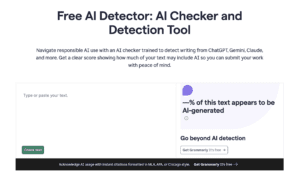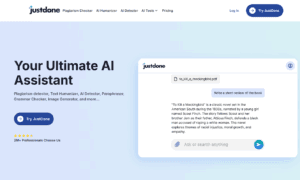AI in Content Marketing: 18 Experts Share Results and Advice
The integration of AI in content marketing is transforming the industry, offering new possibilities and efficiencies. This article presents valuable insights from seasoned professionals who have successfully implemented AI in their content strategies. Discover how AI is reshaping content creation, enhancing engagement, and streamlining workflows across various platforms.
- AI Enhances Content Creation Efficiency
- Interactive Widgets Boost User Engagement
- Scale Content Across Multiple Platforms
- AI Assists Human-Driven Content Process
- Custom GPTs Improve Client Alignment
- AI Agents Refine Editorial Process
- Tailor AI to Your Brand’s Voice
- AI as Collaborative Brainstorming Partner
- Leverage AI for Deep Research
- Use AI as Starting Point
- AI Boosts Consistency and Engagement
- AI Enhances Human-Written Content
- AI Accelerates Local Marketing Campaigns
- AI Reshapes Content Creation Workflow
- AI Unlocks Creative Possibilities
- AI for Research Not Content Generation
- AI Strengthens Content Strategy Planning
- AI Streamlines Neurodivergent Marketer’s Process
AI Enhances Content Creation Efficiency
AI has fully optimized our content creation processes without sacrificing quality. We use AI in generating topics and outlines to assist us in crafting audience-specific content. Also, analyzing competition and gauging audience interest are critical and time-consuming tasks. However, AI has the capability to complete them in a fraction of the time. As a result, our campaign strategy development is enhanced considerably. These tools have significantly improved the efficiency of brainstorming sessions and alignment with search intent, which has led to improved keyword rankings and increased organic traffic for most of our campaigns.
The most essential takeaway for marketers venturing into AI-driven content creation is to consider it an added capability rather than a substitute. I do not recommend relying on AI-written content, but AI is indeed very useful for providing outlines, tracking current and upcoming trends, or even reminding you of things that may have slipped your mind. Nevertheless, it is essential to note that the tone and content provided should remain as human as possible and should ideally reflect actual experiences, expert advice, and relevant statistics to win the trust of readers and editors who value authority over automation. Be sure to use AI to improve creativity, not lessen it.
Brandon Schroth, Founder, Reporter Outreach
Interactive Widgets Boost User Engagement
Using AI in content creation has improved our content delivery in a new and unplanned way. In the past, the majority of our content was text-based with limited engagement. AI helped us overcome this barrier by allowing us to swiftly code and integrate interactive widgets. This meant that we were creating content and presenting it in a more intriguing and dynamic manner, which resulted in users increasing average engagement time and driving more engaged sessions.
My one tip for marketers is to think innovatively about content delivery. As AI tools are now widely accessible, many marketers will likely be producing similar foundational content. The key differentiator will be how you package and present that information. Explore unique delivery mechanisms—like the interactive widgets we developed—or focus on specialized angles, such as highly technical content, that generic AI outputs might not fully capture or articulate with the necessary depth. This is where human oversight and creativity can give you a competitive advantage.
David Fei, Lead Generation Digital Marketer, davidfei.com
Scale Content Across Multiple Platforms
As a small business owner, I’ve noticed a common occurrence for companies like mine: we often invest heavily in the business while neglecting the time required to work on the business to help it expand its reach.
This is where AI has made a significant impact. Incorporating AI into our content creation process has increased efficiency and productivity, enabling us to execute content at scale across multiple platforms. Here’s just one example: We have used AI in our content ideation and creation for articles. We then took completed articles and used AI to create video transcripts for social media content. This has enabled us to reach multiple touchpoints across various platforms by leveraging the thought leadership behind a single article to develop a variety of content that appeals to different consumer types.
My one tip when using AI, as always…is to humanize it!
Readers can spot bot-generated content a mile away. If you aren’t having someone go through and intertwine authority and personal experience into your AI-created content, then it’s a wasted effort—merely regurgitated content.
Justin Staples, Business Entrepreneur, Business Owner, JS Interactive, LLC
AI Assists Human-Driven Content Process
Bringing AI into our content process with our in-house platform, OfficeIQ, has helped us work smarter. It supports the team by helping us draft outlines, repurpose content, and fine-tune for SEO, but the ideas, the voice, and the storytelling? Those are still very much human.
Since using OfficeIQ, we’ve been able to publish more consistently, cover more topics, and produce content with more intention and less stress.
If I had to give one piece of advice to marketers thinking about AI-generated content: don’t hand over the wheel, but let AI help you steer. Use it to save time, not replace thinking. And one honest tip for anyone exploring AI content: don’t obsess over AI detectors. They’re not reliable, and in many cases, they flag even original human-written content as AI-generated. Focus on clarity, tone, and audience connection. If your content is valuable and human-reviewed, that’s what matters most.
Lata Tewari, CMO, Webuters Technologies Pvt Ltd
Custom GPTs Improve Client Alignment
One thing we have done is to create custom GPTs for each client to consolidate all the information about their product, their feedback (which is scattered over emails, Google documents, etc.), competitor comparisons, and deep industry and domain research.
This has boosted our efforts to minimize client’s review effort, ensure accuracy and alignment with client expectations, and speed up our content creation process.
We keep updating our custom GPTs with every piece of feedback and new publishing.
The tip I would like to give out today for marketers is to use AI to beat AI-generated content by adding your marketer magic to it.
And that’s possible only when you know the difference between a well-researched piece and a shallow one, and what will bring business for the client, not penalties from Google or its new AI counterparts.
Aditi Syal, Copywriter, Concurate
AI Agents Refine Editorial Process
Incorporating AI into our content creation process has significantly helped us improve core content-related issues, but not in a way you might expect. We introduced AI to sharpen our editorial lens rather than following the general approach of replacing our writers.
One of the most effective implementations for us was building reader-persona agents trained on survey data, search logs, and customer interviews.
Each draft now undergoes a “live interview” with these AI agents to test relevance for our Ideal Customer Profile (ICP). During review, the agent quickly pinpoints jargon, missing context, dull spots, and even language tonality that may not resonate with the reader.
This approach has yielded impressive results:
- Increased conversion rates on our pages by 28% over four months
- Reduced revision rates by 50%
- Industry research also showed us that AI persona feedback can raise engagement by about 40%
Tip for marketers: Don’t treat AI as a ghostwriter; instead, see it as a critical AI friend. Feed it deep audience insights, then test and iterate relentlessly with real readers to refine your content over time.
Saksham Gogia, Co-founder and Managing Director, WrittenlyHub
Tailor AI to Your Brand’s Voice
The biggest mistake is thinking you can plug in AI and watch brilliance pour out. It doesn’t work like that.
What’s worked for us is building custom GPTs for each client, trained on their own material. Stuff like the CEO’s LinkedIn, internal memos, past content, and brand voice docs. Basically, we teach the AI how they talk, think, and differentiate. This is not a one-and-done process either, we are updating and training that AI every week.
That’s when the results started to show up. Higher engagement, better conversions, and content that felt like it belonged to the brand.
One tip for any marketer using AI:
Make sure your content brings originality and information gain. Out of the box, AI pulls from what already exists online. If you’re just remixing the internet, you’ll sound like everyone else. The brands that win are the ones who incorporate their expertise into their content and then use it to scale their unique point of view.
Rocky Pedden, CEO, RevenueZen
AI as Collaborative Brainstorming Partner
I primarily use AI as a brainstorming partner, treating it like a team member I can bounce ideas off of. It’s especially helpful when I have the spark of an idea but need assistance in shaping it, refining it, or testing how well it might resonate with my audience. The most significant impact AI has had on our marketing is saving time. It streamlines ideation, drafting, and editing, which helps me move faster without compromising quality.
That said, I don’t rely on AI to create content from scratch. For example, I wouldn’t ask ChatGPT to “give me a content calendar for an IT company” because the ideas would likely be too generic and not aligned with our brand voice or customer interests. Instead, I approach AI with clear intent and context.
I might say:
“I want to post to LinkedIn. My idea is to share a case study to build trust with potential clients by showcasing how we successfully implemented ABC. The post will be a caption with a link to the full case study on our website. Here’s the draft caption: ‘Another project successfully implemented…’ Please help me improve this caption to better target potential clients in the ABC industry. Are there any gaps I should address?”
This approach makes AI a collaborator rather than a content machine. I’ve even asked for image suggestions based on certain topics or ideas, and then designed visuals using that inspiration.
One tip for marketers: Use AI to enhance your voice, not replace it. Know your brand, your audience, and your message first, then use AI to polish and support your ideas. Audiences can tell when something feels artificial. The human touch is still what connects best.
Tianette van Staden, Owner & CEO, Lollie’s Handmade
Leverage AI for Deep Research
I started using AI-generated content before ChatGPT, and here’s the #1 tip:
Don’t autogenerate and publish.
Do this instead:
1. Leverage Google Gemini’s deep research.
The reports are insanely detailed and will save you a massive amount of research time.
2. Turn the research into a prompt for content.
This is the key to success. The better your inputs, the better your content will perform.
3. Use an SEO-centric tool like Rankability to generate the AI content.
Tools like Rankability use NLP to create incredibly relevant content. When you stack deep research + NLP, you get a perfect recipe for content that algorithms devour.
4. Remember that uniqueness is more than just the copywriting.
Try to make all of your images 100% unique.
Nathan Gotch, CEO, Rankability
Use AI as Starting Point
As a content writer, I’ve been using AI as an essential tool for a while now. It is no longer an option—it’s a necessity. AI tools like ChatGPT and other chatbots have enabled us to write faster, generate ideas more efficiently, and reduce content production costs. One must use these tools to stay competitive in a saturated market.
So, the one tip I’d give to those who are considering AI-generated content is as follows:
Don’t use AI-generated content as is.
While using language models for brainstorming, outlining, editing, and getting feedback is a good idea, you should avoid letting them replace your own voice. Use generated content as a starting point—add your insights, examples, and storytelling rather than relying solely on AI to write for you. Let these tools help you work smarter, but ensure your unique voice and insight lead the final product.
Irene Fenswick, Writer, Ivypanda Study Hub
AI Boosts Consistency and Engagement
Last year, I was completely overwhelmed. Between writing blog posts, creating social media content, and drafting emails, I barely had time to think about strategy. That’s when I decided to try AI tools for content creation.
I’ll be honest—I was skeptical at first. Would AI make my content sound robotic? Would it hurt my brand’s voice? But after experimenting for a few months, the results surprised me.
My biggest win wasn’t just speed (though cutting blog writing time from 4 hours to 90 minutes was amazing). It was consistency. Before AI, I’d sometimes skip posting because I was too busy or stuck on what to write. Now I post regularly, and my audience engagement has grown significantly.
Our email campaigns perform better too. I use AI to brainstorm subject lines, then pick the ones that match our tone. Open rates went up about 25% just from having more options to choose from.
Here’s what I tell other marketers: AI is a starting point, not a finish line.
I never publish anything straight from an AI tool. Instead, I use it to get past that dreaded blank page, then I rewrite everything in my own voice. I add personal stories, specific examples from our clients, and opinions that only I can share.
Think of it like having a research assistant who gives you a rough outline. You still need to do the real work—adding personality, checking facts, and making sure it actually helps your readers.
The best content happens when you combine AI’s efficiency with your human insights. Your readers want to hear from you, not a robot. Use AI to save time, but make sure your personality shines through.
Kishan Soni, SAAS SEO Specialist, Dreamcast
AI Enhances Human-Written Content
Incorporating AI into our content process has been a game-changer—but only when used correctly. AI massively boosts output and speeds up tasks like research, outlines, and early drafts. However, here’s the catch: you can’t treat it like a human replacement. Early on, we A/B tested AI-written vs. human-written content. Human-written content won almost every time—and with search engines now flagging AI content, quality matters more than ever.
My advice: use AI as a tool to enhance, not replace. Let it help you brainstorm, structure, or refine your work, but always inject your own voice, experience, and insights. Copy-paste jobs don’t cut it anymore. Content still needs a human touch to perform well and actually connect with the audience.
CJ Miller, CEO, Techtonic Marketing
AI Accelerates Local Marketing Campaigns
Incorporating AI into our content creation has significantly changed the way we work, especially with local marketing campaigns for small business websites.
Before AI, we spent a lot of time doing keyword research, drafting blog posts, and updating service pages manually. It was effective but slow. Once we introduced AI tools into our workflow, we started using them to generate first drafts, repurpose content into different formats (like FAQs, social posts, or Google Business updates), and even brainstorm ideas tailored to local search intent. That allowed us to move faster while still keeping quality high through manual editing and brand alignment.
Recently, we used AI to create a full series of city-specific service pages based on the core template we wrote. Instead of writing 15 different pages from scratch, we had AI build the base content. Then we localized and polished each one manually. The result? A 38% increase in organic traffic in just under 90 days, and over 40 new inbound calls tracked directly from those pages.
My advice to marketers considering AI-generated content: Use AI to speed up your process, not replace your voice—it’s a tool, not a shortcut.
Chasen Mushiana, Founder, Beazy Marketing
AI Reshapes Content Creation Workflow
I can confidently say AI is fundamentally reshaping how we create, scale, and refine content.
We now produce high-quality, targeted content at a pace that honestly felt impossible just a couple of years ago.
Here’s what’s changed:
- 800-word landing pages used to take our writers about 4 hours to fully draft and polish. Now, we’re consistently down to 2 hours or less, start to finish, including editing and SEO optimization.
- Non-technical long-form blog posts (2,000+ words) were an all-day effort. But with AI taking on the heavy lifting (structure, ideation, rough drafts), we’re producing content of equal (or better) quality in just 3.5 hours on average.
- Topic ideation? What used to be a 30-minute creative session now takes 5 minutes using AI-generated prompt variations.
AI helps our bilingual and non-native English writers find phrasing that resonates culturally with our U.S. audience. It’s not just the grammar that AI tools flag and fix instantly, but also about tone, nuance, and relatability.
It bridges the gap between good writing and writing that connects.
We’ve also:
- Scaled content production by 2.5x—no extra hires
- Created a consistent tone and structure across multiple writers
- Delivered faster turnarounds, allowing us to act on trends in real-time
- Seen direct improvements in organic traffic, CTR, and content engagement for clients
Don’t treat AI like a shortcut. Use it for what it’s great at: ideation, rough drafts, and data analysis. But your voice, your experience, your story, that still matters.
Keep the human in the loop, always. If you’re on the fence about AI, start small. Test it on a few blog posts or ad variations. You’ll feel the shift in speed, clarity, quality, and output.
Shawn Byrne, CEO, My Biz Niche
AI Unlocks Creative Possibilities
Incorporating AI into my content creation process didn’t just improve marketing results—it completely changed what I thought was possible.
There are creative executions I simply wouldn’t have attempted without the support of AI tools. Whether it was generating visuals, writing long-form thought leadership, or creating multilingual content at scale—AI enabled me to go from idea to execution without relying on a full creative team or outsourcing. It removed the barriers between strategy and action.
The impact was tangible:
- Speed to market accelerated dramatically—from days to hours.
- Volume and variety increased, allowing me to test new formats and ideas regularly.
- Cost efficiency improved, especially for things I would’ve previously outsourced like illustration, translation, or SEO blog writing.
- Creative confidence went up—knowing I had a toolkit to explore ideas without bottlenecks.
- Engagement improved, particularly when pairing AI-generated content with human insight and storytelling.
But let me be clear: AI didn’t replace creativity. It unlocked it. It gave me the freedom to think bigger, experiment more, and iterate faster.
One tip I’d give to marketers considering AI-generated content?
Start by identifying where you’re holding back—what ideas are stuck in your head because you lack the time, resources, or team to execute? AI won’t magically create world-class content on its own, but it will get you to version one faster than anything else. From there, your expertise takes over.
Treat AI as your creative partner—not your replacement. Use it to extend your capabilities, not lower your standards.
Patrick Lynch, Founder, broden.ai
AI for Research Not Content Generation
Incorporating AI helps us a lot with time and other resource consumption. We’re now able to create precise headlines after multiple iterations. The blogging process has become a breeze. We simply prompt in what we want to write about, do the research, and get a good blog outline. After a few corrections and multiple iterations, we are now able to get the perfect blog outline. This process used to take hours earlier, but now it takes only a few minutes to an hour at the most.
My advice is to not use AI-generated content at all, even as a first draft. Just take the research material from AI and then start the manual writing process. We ditched AI drafts and started writing content fully manually. This improved search impressions for our own agency over the span of 3-6 months; and also for our clients. Pretty much all the accounts are now immune to Google Core updates. And, of course, we do quarterly website audits and fix technical issues.
AI generated content isn’t worth the hype. We noticed over the year that even the latest and advanced models are still hallucinating the statistical data. It’s too risky.
So, AI is to be used only for research, content ideation, and structure.
Paranjyothi Sripada, Director of Digital Strategy, Orange Carrot
AI Strengthens Content Strategy Planning
Incorporating AI into our content strategy—rather than relying on it to generate the actual content—has transformed how we approach marketing. We use AI tools to map out a cohesive, long-term content framework that breaks down into quarterly and monthly campaigns. This ensures we cover core themes comprehensively and avoid the reactive, scattershot approach that often plagues content efforts.
AI also helps us analyze audience data and content performance to identify topic gaps, prioritize messaging, and optimize the sequence and timing of content releases. Importantly, it enables us to connect the dots across platforms—blog posts, social media, email, and even offline touchpoints—so each piece of content supports the others and reinforces a unified narrative. This cross-channel cohesion has noticeably improved engagement and conversion rates.
One tip for marketers: start by using AI to strengthen your content planning and orchestration. A clear, data-informed strategy will amplify the impact of everything you create. Resist the temptation to lean on AI purely for content production—your brand’s voice and authenticity should always remain front and center.
Ryan Drake, President, NetTech Consultants, Inc.
AI Streamlines Neurodivergent Marketer’s Process
Incorporating AI into my content creation process has been a game-changer, especially as a neurodivergent marketer who sometimes struggles with overwhelm or executive dysfunction. It has allowed me to streamline the ideation phase, structure my thoughts faster, and repurpose content across platforms more effectively. Instead of staring at a blank screen, I can prompt ideas and then add my own voice, experiences, and values.
One specific impact has been consistency. Before using AI tools, my content often came in bursts when I had the mental energy. Now, I can maintain a more regular posting schedule, which has boosted engagement and trust with my audience. It has also helped me free up time to focus on strategy, community building, and the parts of content I enjoy most, like storytelling and visuals.
My top tip for marketers using AI? Don’t use it to replace your voice; use it to amplify it. The magic happens when AI gives you a foundation, and you layer in your lived experience, values, and empathy. That’s what makes content connect on a human level.
Rhiannon Cooper, Content Creator, Not So Typical
Related Articles
- The Future AI And Content Marketing: PRNEWS.IO CEO on … – TechBullion
- Master the Hidden Code: How Python-Powered AI Turns Ordinary Marketing
- AI in Marketing: Khushboo Gulabani Breaks Down Key Trends for 2025



































